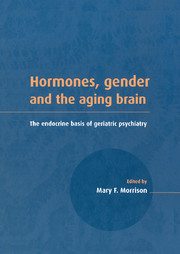Book contents
- Frontmatter
- Contents
- List of contributors
- Preface
- Acknowledgments
- Part I Overview
- Part II Hormones and mental health in the elderly
- 3 The hypothalamic–pituitary–adrenal axis in aging: preclinical and clinical studies
- 4 The hypothalamic–pituitary–thyroid axis
- 5 Estrogen and depression in aging women
- 6 The role of testosterone in male depression
- 7 Dehydroepiandrosterone in aging and mental health
- 8 Sex hormones, cognition, and dementia in the elderly
- 9 Effects of estrogen on basal forebrain cholinergic neurons and cognition: implications for brain aging and dementia in women
- 10 Gender and schizophrenia
- 11 Sex steroids and anxiety disorders
- 12 Gender and hormonal factors in pain and pain inhibition
- Part III Effects of hormones and behavior on immune function
- Part IV Hormones and gender differences in psychotropic drug metabolism
- Index
5 - Estrogen and depression in aging women
from Part II - Hormones and mental health in the elderly
Published online by Cambridge University Press: 18 September 2009
- Frontmatter
- Contents
- List of contributors
- Preface
- Acknowledgments
- Part I Overview
- Part II Hormones and mental health in the elderly
- 3 The hypothalamic–pituitary–adrenal axis in aging: preclinical and clinical studies
- 4 The hypothalamic–pituitary–thyroid axis
- 5 Estrogen and depression in aging women
- 6 The role of testosterone in male depression
- 7 Dehydroepiandrosterone in aging and mental health
- 8 Sex hormones, cognition, and dementia in the elderly
- 9 Effects of estrogen on basal forebrain cholinergic neurons and cognition: implications for brain aging and dementia in women
- 10 Gender and schizophrenia
- 11 Sex steroids and anxiety disorders
- 12 Gender and hormonal factors in pain and pain inhibition
- Part III Effects of hormones and behavior on immune function
- Part IV Hormones and gender differences in psychotropic drug metabolism
- Index
Summary
Introduction
Although the prevalence of major depression decreases in aging women, there is an increased prevalence of non-major depressive disorders in women after the age of 65. These minor depressive syndromes are two to three times as common in older women as in men of the same age. The reasons for this sex difference in the prevalence of depressive symptoms are not known. Aging women experience significant changes in social role and relationships, health status, family composition and economic status, all of which may present intense psychological challenges that could contribute to depression.
Aging women also undergo distinct biological changes, the impact of which on mood remains to be clarified. These biological changes, which are the focus of this book, include decreasing levels of hormones such as estradiol, testosterone, dehydroepiandrosterone, progesterone, insulin-like growth factor, and growth hormone. Estrogen deficiency, in particular, has been suggested as one cause of the non-major depressive disorders in elderly women. Moreover, estrogen replacement, including use of the specific estrogen receptor modulators tamoxifen and raloxifene, is increasingly recommended for disease prevention after menopause. The psychological consequences of such treatments are not well understood. If we are to consider the use of estrogen and other sex hormones to prevent or treat depressive symptoms in aging women, it will be important to understand the psychological, pharmacological, and biochemical effects of these agents.
Epidemiology of depressive disorders in aging
Gender differences in the epidemiology and phenomenology of depression may be informative about the neurobiology of depressive disorders.
- Type
- Chapter
- Information
- Hormones, Gender and the Aging BrainThe Endocrine Basis of Geriatric Psychiatry, pp. 84 - 113Publisher: Cambridge University PressPrint publication year: 2000



